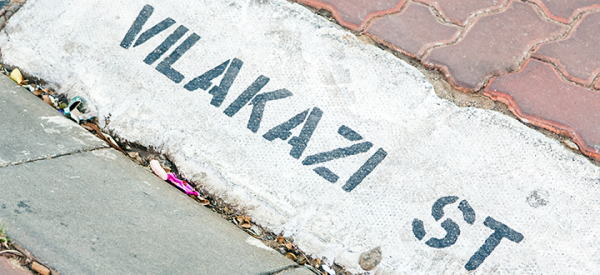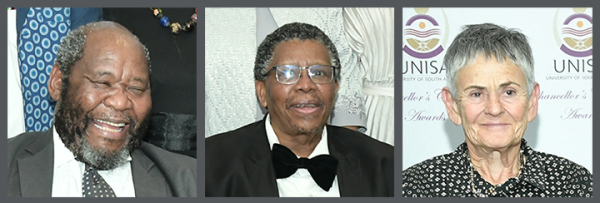Alumni
Vilakazi Street: a legacy of Unisa alumni and resilient education
In the heart of Soweto, South Africa, lies a street embedded in history, where echoes of the past intertwine with the vibrant present. Vilakazi Street, once an emblem of the struggle for democracy, now stands as a testament to resilience, boasting cultural significance and educational heritage. People come from all over the world to taste the authentic kasi flavour, attend festivals and buy art.

Vilakazi Street Painted road sign
At the forefront of Vilakazi Street's legacy are three iconic figures and Unisa alumni whose lives are intertwined with South African history: former President Nelson Mandela, Archbishop Desmond Tutu and Dr Benedict Vilakazi. What makes their connection even more profound is their shared affiliation with the Unisa, an institution that played a pivotal role in shaping the academic landscape of apartheid-era South Africa.
Mandela and Tutu, both Nobel Peace Prize winners, called Vilakazi Street home during critical junctures in their lives. Their presence not only lent prestige to the street but also symbolised the spirit of resilience and unity that defined "The Struggle". As products of Unisa, they exemplified the university's commitment to providing access to education to all, irrespective of imposed barriers.

Former President Nelson Mandela, Archbishop Desmond Tutu and Dr Benedict Wallet Vilakazi
Mandela resided at 8115 Vilakazi Street during the 1940s and 1950s. The house where he lived has been preserved as a museum, providing visitors with insight into his life and the struggle against apartheid. The house is a modest, single-story red brick dwelling with a tin roof. It reflects the typical style of homes in the area during that time.
Tutu lived at 957A Vilakazi Street during the 1970s and 1980s. Similar to Mandela's residence, Tutu's former home has also been preserved and converted into a museum.
Mandela describes his house in his book Long Walk to Freedom as identical to all the others in the area. They were built on postage stamp-sized plots and the area had dirt roads. He describes the small kitchen, cement floors, the bucket toilet at the back and the use of paraffin lamps. Significantly, he said, "but it was my first true home of my own and I was mighty proud. A man is not a man until he has a house of his own…"
Yet perhaps the most touching connection to Vilakazi Street lies in its namesake, Benedict Vilakazi. The street was named in his honour due to his significant contribution to the literary and cultural landscape of South Africa. A distinguished novelist, poet and Unisa alumni, completing a BA degree in 1943, Vilakazi's literary contributions have left an indelible mark on South African culture. His works, infused with the rhythms of township life and the resilience of the human spirit, captured the essence of the struggle against oppression. It is fitting that a street bearing his name serves as a beacon of hope and inspiration, a reminder of the power of education to transcend barriers and transform lives.
His first book of verse, Inkondlo kaZulu ("Zulu National Songs", 1935), was the first collection of Western-influenced poetry ever published in the Zulu language. His poem "If Death" describes the soul of his desire for peace and tranquillity.
If Death
Bury me where the grasses grow
Below the weeping willow trees
To let their branches shed upon me
Leaves of varied greens.
Then, as I lie there, I shall hear
The grasses sigh a soft behest:
" Sleep, beloved one, sleep and rest."
Bury me in a place like this:
Where those who scheme and give their tongues
To plots and anger, never can
Displace the earth that covers me
Nor ever keep me from my sleep.
If you who read these lines should chance
To find me, 0 then bury me
Where grasses whisper this behest:
" Sleep, beloved one, sleep and rest."
- Benedict Vilakazi
Strolling down Vilakazi Street, the ambience is intense. History echoes through the quaint cafes, bustling markets and murals decorating the walls. It is a place where the past and present meet, where stories of triumph and tribulation are etched into the very fabric of the community.
Amidst the hustle and bustle, Unisa stands as a beacon of opportunity, offering a diverse range of qualifications to those who were denied access during turbulent years. Through its commitment to inclusive education, Unisa continues to empower generations of South Africans and global students to pursue their dreams and shape a brighter future.
In celebrating Vilakazi Street, we pay homage to the resilience of the human spirit, the power of education, and the enduring legacy of those who dared to dream of a better tomorrow. It is a place where history comes alive, where the echoes of the past inspire us to forge a path of progress and reconciliation.
* By Cilla Boucher, Alumni Relations Officer, Unisa Foundation and Alumni Relations, with input from ChatGPT
Publish date: 2024/11/06

 Unisa co-hosts G20 community outreach in the Eastern Cape
Unisa co-hosts G20 community outreach in the Eastern Cape
 Unisans gain membership of prestigious science academies
Unisans gain membership of prestigious science academies
 Advocating for disability transformation through servant leadership
Advocating for disability transformation through servant leadership
 Unisa Press continues to illuminate the publishing space
Unisa Press continues to illuminate the publishing space